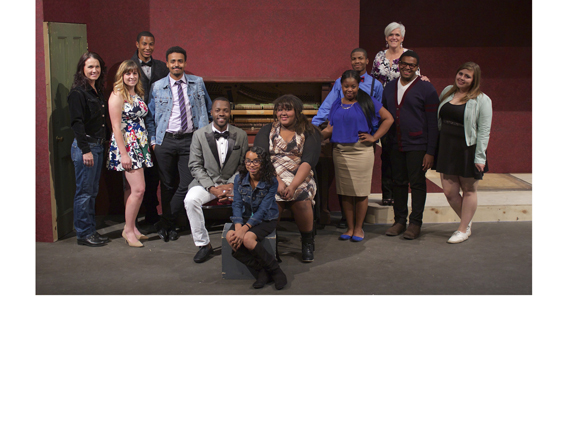When entertainment and education mingle, the results can be unpredictable. The ongoing Grossmont College production of the August Wilson play “The Piano Lesson,” though, is both an engaging experience for audience theatergoers and an obviously great set of acting lessons for the student performers appearing in this Pulitzer Prize winning drama.
When entertainment and education mingle, the results can be unpredictable. The ongoing Grossmont College production of the August Wilson play “The Piano Lesson,” though, is both an engaging experience for audience theatergoers and an obviously great set of acting lessons for the student performers appearing in this Pulitzer Prize winning drama.
The eight-member cast delivers strong performances, strikingly good role enactments for young performers in their teens and early 20s. Further, the characters called on for singing carry off the musical passages of the play exceptionally well. Their stage presence is impressive. And these youthful actors believably portray characters ranging from young adulthood into middle age.
The play’s setting is Pittsburgh, Pennsylvania, in 1936, at the home of the Charles family. In the aftermath of the Great Depression in America, this African-American family finds work hard and not well paid, life spare but providing hope for better tomorrows. The centerpiece object in the family’s downstairs living room is an unusual upright piano. Carved into the wood front above the keyboard are images of the Charles family’s forebears, telling tales of their struggles under the bondage of slavery. The piano has a tortuous history itself.
Blues music and Bible verses provide the rhythms and nuances serving as backdrops for events in the play. Recurring themes and symbols woven throughout the play’s narrative involve trains, ghosts and that remarkable piano.
Beth Duggan, Theatre Arts Department Chair, directed the play. She introduced the performance to the audience on opening night, May 7, said, “This night is history making. Tonight’s performance is the first time an August Wilson play has been staged in our theater department. This play shows a little slice of life.” She thanked the cast and theater crew for making the show possible, and then said, “We hope you enjoy it.”
And the crowd certainly did appreciate the show from start to finish, with applause at every scene shift. The diverse audience at the well-attended opening night performance included youngsters through seniors. The house seats were nearly filled, with almost 150 in attendance.
The first act of the play commences with Boy Willie Charles (portrayed by Glynn Long) and family friend Lymon (Jarel Lewis) arriving at the Charles home at 5 a.m. one morning, after driving a truckload of watermelons from Mississippi, where the family had lived. Boy Willie’s uncle Doaker Charles (Yusuf O. Yusuf), head of the household, greets the pair, and Boy Willie asks to see his sister, Berniece (Janelle Wilson), who is asleep upstairs.
The siblings’ initial re-encounter that early morning sets off their looming confrontation over the fate of the family’s heirloom piano. Boy Willie wants to sell the instrument to acquire enough money to purchase the land their former slaveholder, Sutter, had owned. Berniece is adamant that she will never sell that piano, both because of its meaning in the family’s history and because of its usefulness in offering her daughter, Maretha (Lily Bradley), piano-playing skills to guarantee her future career success as a schoolteacher. The play ultimately explores different ways that a family’s past can influence descendants’ lives, through the choices these individuals make about how to put a legacy to use.
Other supporting characters in the play are Wining Boy Charles (Nick Cade), who is Doaker’s ne’er-do-well musician-gambler elder brother; Avery (Kian Klin), a preacher courting the widowed Berniece; and Grace (Betty Brezil), a neighborhood woman who romances Boy Willie and Lymon in succession.
Corollary themes recurring throughout the play deal with the role of religion in life, the different effects choices have for women and men, and the differences in treatment that African-Americans still labored to overcome after slavery had ended.
Asked about how this play was chosen, Duggan explained that the department selects a wide variety of plays on a two-year cycle roughly coinciding with the college’s theater arts degree program. The intent is to rotate through performance genres, so that students may have exposure to comedies, dramas, musicals in the repertoire of roles they have taken. Each season’s choices are set a year in advance.
The opportunity for producing an August Wilson play arose when the department’s current class included a couple of promising black actors, and this particular play could “showcase their talents,” according to Duggan. She further described how the possible plays are constrained by students enrolled in the department’s classes, their personal characteristics and the roles they can take on.
But this yielded other benefits, Duggan observed. “These actors really bonded to the script. The material resonated with them. And they bonded with each other too, as if they actually had a family connection.” Duggan discussed another outcome that delighted her — these student actors were sufficiently intrigued by the play that they investigated the history of black American experience during the 1930s.
Performances of “The Piano Lesson” continue at 7:30 p.m. on May 14, 15 and 16, with an additional Sunday afternoon performance on May 16 at 2 p.m. The Grossmont College Stagehouse Theatre is located on the college’s campus, at 8800 Grossmont College Drive in El Cajon. The theater is in Building 21, Room 247. Ticket information is available by calling (619) 644-7234. Tickets can be ordered online at www.grossmont.edu/theatrebrochure.













